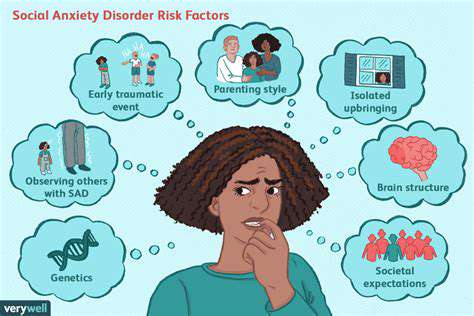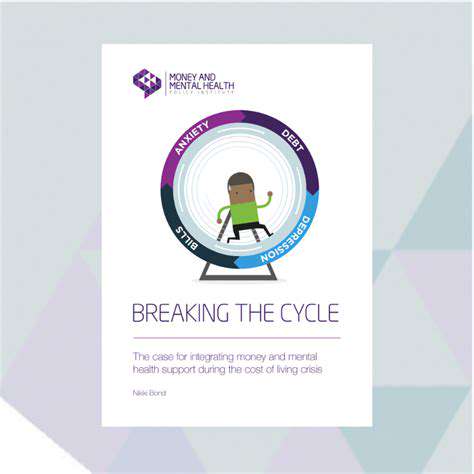The Connection Between Anxiety and Low Self Esteem
The Impact of Social Anxiety on Self-Esteem

Social Anxiety and Academic Performance
Students grappling with social anxiety often face unique hurdles in academic settings. The fear of speaking up in class or participating in group work can leave them feeling isolated and struggling to keep up with coursework. Many avoid raising their hands, dread presentations, and withdraw from collaborative assignments—behaviors that directly impact their learning outcomes and grades.
This constant state of nervousness frequently leads to sleep problems, trouble focusing, and diminished study motivation. As academic pressures mount, they often intensify social anxiety symptoms, creating a self-perpetuating cycle that's difficult to escape. Without intervention, this pattern can persist throughout one's educational journey.
Social Anxiety and Interpersonal Relationships
Building meaningful connections becomes particularly challenging for those with social anxiety. Simple interactions like starting conversations or attending social events feel overwhelming, often resulting in loneliness and isolation. This lack of social connection can severely impact emotional well-being and life satisfaction.
During critical developmental periods like adolescence, when peer relationships are crucial, social anxiety can create significant barriers. The persistent worry about being judged or evaluated negatively often prevents individuals from forming the deep connections they desire. This can lead to missed opportunities for friendship and romantic relationships during formative years.
Social Anxiety and Career Development
Professional growth frequently suffers when social anxiety goes unaddressed. Many qualified individuals bypass promising job opportunities due to interview anxiety or avoid networking events that could advance their careers. The workplace demands for presentations and team collaboration can feel particularly daunting.
Career progression often hinges on one's ability to communicate ideas effectively and build professional relationships. When social anxiety interferes with these fundamental skills, it creates invisible barriers to career advancement and job satisfaction. Many talented professionals find themselves stuck in positions below their capabilities due to these challenges.
Social Anxiety and Mental Health
The psychological toll of chronic social anxiety extends far beyond situational discomfort. Left unmanaged, it significantly increases vulnerability to depression, substance abuse, and other anxiety disorders. The constant stress of anticipating and avoiding social situations can dominate one's life.
Early recognition and treatment of social anxiety can prevent more severe mental health complications down the road. Professional support provides essential tools for managing symptoms and improving overall quality of life. Cognitive-behavioral approaches have proven particularly effective in breaking negative thought patterns.
Strategies for Breaking the Cycle

Understanding the Cycle
Breaking free from negative patterns begins with careful self-observation. Tracking when anxiety peaks, what triggers it, and how you typically respond creates a roadmap for change. This awareness helps anticipate challenging situations and prepare constructive responses.
Many people discover their reactions follow predictable sequences. Recognizing these personal patterns is the first step toward interrupting automatic responses that maintain the anxiety cycle. Journaling or working with a therapist can illuminate these connections.
Identifying Root Causes
Social anxiety often stems from complex interplays of temperament, childhood experiences, and learned behaviors. Exploring these origins isn't about assigning blame, but understanding how current reactions developed. This insight allows for more targeted interventions.
Professional guidance often proves invaluable for uncovering deeper psychological contributors. Therapists can help identify whether current anxieties relate to past experiences or unmet emotional needs in ways that self-reflection alone might miss.
Developing Coping Mechanisms
Effective strategies vary by individual, but often include gradual exposure to feared situations paired with relaxation techniques. Building a toolkit of coping methods ensures flexibility when facing different social challenges. What works for small talk may differ from what helps during formal presentations.
Mindfulness practices help ground individuals in the present moment, reducing preoccupation with potential negative outcomes. Regular practice strengthens the ability to observe anxious thoughts without becoming overwhelmed by them. This mental distance creates space for more balanced responses.
Building Support Systems
Isolation both results from and worsens social anxiety. Cultivating understanding relationships provides emotional safety nets when facing social challenges. Support groups specifically for social anxiety can be particularly valuable, offering both practical advice and normalization of shared experiences.
Trusted friends or family members can serve as practice partners for social skills development. Having even one supportive person who understands the struggle makes the journey feel less daunting. These connections provide reality checks against distorted negative self-perceptions.
Maintaining Momentum and Preventing Relapse
Progress rarely follows a straight line. Viewing occasional setbacks as learning opportunities rather than failures sustains long-term growth. Regular self-assessment helps identify what strategies work best in different contexts.
Celebrating small victories builds confidence to tackle bigger challenges. Developing resilience means recognizing that social skills, like any others, improve with consistent practice over time. Keeping a progress journal can make gradual improvements more visible.
Seeking Support and Building Resilience
Understanding the Intertwined Nature of Anxiety and Low Self-Esteem
Anxiety and self-esteem issues frequently reinforce each other in damaging cycles. Negative self-talk (I'll embarrass myself) fuels anxiety, while anxious episodes (I froze during my presentation) then confirm negative self-views. Breaking this cycle requires addressing both components simultaneously.
Many individuals become hyperaware of perceived social missteps while discounting successful interactions. This selective attention to the negative maintains both low self-esteem and social anxiety over time. Cognitive restructuring techniques help challenge these automatic thought patterns.
Identifying the Root Causes of Anxiety and Low Self-Worth
Early experiences often shape social confidence foundations. Childhood bullying, critical parenting, or social exclusion can plant seeds for later anxiety. Cultural factors like perfectionism or collectivist expectations may compound these individual experiences.
Understanding these origins helps separate past experiences from current realities. Many adults continue reacting to social situations as they did as vulnerable children, without recognizing their developed capabilities. Therapy can help update these outdated self-perceptions.
Seeking Support for Overcoming Challenges
Professional help provides structured approaches that self-help often can't match. Cognitive-behavioral therapists specialize in evidence-based techniques for social anxiety, from exposure therapy to social skills training. Group therapy offers safe environments to practice interactions with professional guidance.
Online communities provide 24/7 support between sessions. Hearing others' similar struggles reduces shame while providing practical tips from those further along in recovery. Many find combining professional and peer support creates optimal conditions for growth.
Developing Healthy Coping Mechanisms and Strategies
Effective techniques range from physiological (diaphragmatic breathing) to cognitive (thought records). Behavioral experiments that test feared outcomes (Will people really laugh if I stumble over my words?) often prove most powerful for creating lasting change.
Gradual exposure—starting with mildly challenging situations and progressing systematically—builds confidence through accumulated successes. Many are surprised to discover their feared outcomes rarely materialize as catastrophically as imagined.
Building Self-Compassion and Fostering Positive Self-Talk
Shifting from self-criticism to self-support represents a fundamental change for many. Learning to extend to oneself the same kindness offered to friends facing similar challenges transforms one's emotional landscape. This doesn't mean excusing avoidance, but rather encouraging brave efforts.
Positive affirmations work best when grounded in reality rather than empty platitudes. Noticing genuine strengths (I prepared thoroughly for this meeting) builds authentic confidence over time. Keeping a success log helps counterbalance the brain's natural negativity bias.